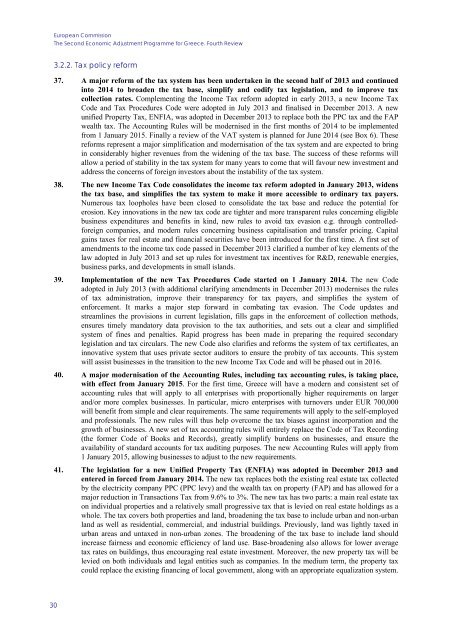ocp192_en
ocp192_en
ocp192_en
You also want an ePaper? Increase the reach of your titles
YUMPU automatically turns print PDFs into web optimized ePapers that Google loves.
European CommissionThe Second Economic Adjustm<strong>en</strong>t Programme for Greece. Fourth Review3.2.2. Tax policy reform37. A major reform of the tax system has be<strong>en</strong> undertak<strong>en</strong> in the second half of 2013 and continuedinto 2014 to broad<strong>en</strong> the tax base, simplify and codify tax legislation, and to improve taxcollection rates. Complem<strong>en</strong>ting the Income Tax reform adopted in early 2013, a new Income TaxCode and Tax Procedures Code were adopted in July 2013 and finalised in December 2013. A newunified Property Tax, ENFIA, was adopted in December 2013 to replace both the PPC tax and the FAPwealth tax. The Accounting Rules will be modernised in the first months of 2014 to be implem<strong>en</strong>tedfrom 1 January 2015. Finally a review of the VAT system is planned for June 2014 (see Box 6). Thesereforms repres<strong>en</strong>t a major simplification and modernisation of the tax system and are expected to bringin considerably higher rev<strong>en</strong>ues from the wid<strong>en</strong>ing of the tax base. The success of these reforms willallow a period of stability in the tax system for many years to come that will favour new investm<strong>en</strong>t andaddress the concerns of foreign investors about the instability of the tax system.38. The new Income Tax Code consolidates the income tax reform adopted in January 2013, wid<strong>en</strong>sthe tax base, and simplifies the tax system to make it more accessible to ordinary tax payers.Numerous tax loopholes have be<strong>en</strong> closed to consolidate the tax base and reduce the pot<strong>en</strong>tial forerosion. Key innovations in the new tax code are tighter and more transpar<strong>en</strong>t rules concerning eligiblebusiness exp<strong>en</strong>ditures and b<strong>en</strong>efits in kind, new rules to avoid tax evasion e.g. through controlledforeigncompanies, and modern rules concerning business capitalisation and transfer pricing. Capitalgains taxes for real estate and financial securities have be<strong>en</strong> introduced for the first time. A first set ofam<strong>en</strong>dm<strong>en</strong>ts to the income tax code passed in December 2013 clarified a number of key elem<strong>en</strong>ts of thelaw adopted in July 2013 and set up rules for investm<strong>en</strong>t tax inc<strong>en</strong>tives for R&D, r<strong>en</strong>ewable <strong>en</strong>ergies,business parks, and developm<strong>en</strong>ts in small islands.39. Implem<strong>en</strong>tation of the new Tax Procedures Code started on 1 January 2014. The new Codeadopted in July 2013 (with additional clarifying am<strong>en</strong>dm<strong>en</strong>ts in December 2013) modernises the rulesof tax administration, improve their transpar<strong>en</strong>cy for tax payers, and simplifies the system of<strong>en</strong>forcem<strong>en</strong>t. It marks a major step forward in combating tax evasion. The Code updates andstreamlines the provisions in curr<strong>en</strong>t legislation, fills gaps in the <strong>en</strong>forcem<strong>en</strong>t of collection methods,<strong>en</strong>sures timely mandatory data provision to the tax authorities, and sets out a clear and simplifiedsystem of fines and p<strong>en</strong>alties. Rapid progress has be<strong>en</strong> made in preparing the required secondarylegislation and tax circulars. The new Code also clarifies and reforms the system of tax certificates, aninnovative system that uses private sector auditors to <strong>en</strong>sure the probity of tax accounts. This systemwill assist businesses in the transition to the new Income Tax Code and will be phased out in 2016.40. A major modernisation of the Accounting Rules, including tax accounting rules, is taking place,with effect from January 2015. For the first time, Greece will have a modern and consist<strong>en</strong>t set ofaccounting rules that will apply to all <strong>en</strong>terprises with proportionally higher requirem<strong>en</strong>ts on largerand/or more complex businesses. In particular, micro <strong>en</strong>terprises with turnovers under EUR 700,000will b<strong>en</strong>efit from simple and clear requirem<strong>en</strong>ts. The same requirem<strong>en</strong>ts will apply to the self-employedand professionals. The new rules will thus help overcome the tax biases against incorporation and thegrowth of businesses. A new set of tax accounting rules will <strong>en</strong>tirely replace the Code of Tax Recording(the former Code of Books and Records), greatly simplify burd<strong>en</strong>s on businesses, and <strong>en</strong>sure theavailability of standard accounts for tax auditing purposes. The new Accounting Rules will apply from1 January 2015, allowing businesses to adjust to the new requirem<strong>en</strong>ts.41. The legislation for a new Unified Property Tax (ENFIA) was adopted in December 2013 and<strong>en</strong>tered in forced from January 2014. The new tax replaces both the existing real estate tax collectedby the electricity company PPC (PPC levy) and the wealth tax on property (FAP) and has allowed for amajor reduction in Transactions Tax from 9.6% to 3%. The new tax has two parts: a main real estate taxon individual properties and a relatively small progressive tax that is levied on real estate holdings as awhole. The tax covers both properties and land, broad<strong>en</strong>ing the tax base to include urban and non-urbanland as well as resid<strong>en</strong>tial, commercial, and industrial buildings. Previously, land was lightly taxed inurban areas and untaxed in non-urban zones. The broad<strong>en</strong>ing of the tax base to include land shouldincrease fairness and economic effici<strong>en</strong>cy of land use. Base-broad<strong>en</strong>ing also allows for lower averagetax rates on buildings, thus <strong>en</strong>couraging real estate investm<strong>en</strong>t. Moreover, the new property tax will belevied on both individuals and legal <strong>en</strong>tities such as companies. In the medium term, the property taxcould replace the existing financing of local governm<strong>en</strong>t, along with an appropriate equalization system.30


